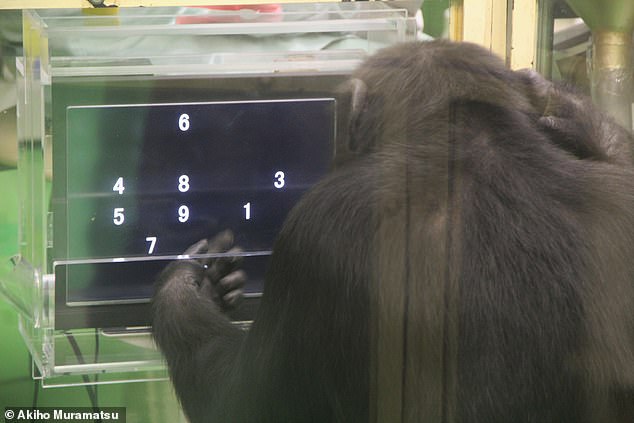Chimpanzees are show-offs! Monkeys perform better on difficult computer tasks when they have an audience, research shows
From comedians to singers, some people just perform better in front of an audience.
Now experts have discovered that this phenomenon can be traced back to the ancestors of our monkeys.
Researchers found that chimpanzees’ performance on computer tasks is affected by the number of people looking at them.
And the findings suggest that this “audience effect” predates the development of human societies concerned about reputation, they said.
A team from Kyoto University in Japan analyzed thousands of sessions recorded over six years at a research site where chimpanzees completed a touchscreen task.
“Our research site is special because chimpanzees here often interact with and even enjoy the company of humans, participating almost daily in various touchscreen experiments for food rewards,” said author Akiho Muramatsu.
‘As such, we saw the opportunity to not only explore potential similarities in audience-related effects, but also to do so in the context of chimpanzees that share a unique bond with humans.’
They found that the chimpanzees performed better on the most difficult task as the number of people watching them increased.
From comedians to singers, some people just perform better in front of an audience. Now experts have discovered that this phenomenon can be traced back to our monkey ancestors (stock image)

Researchers found that chimpanzees’ performance on computer tasks is affected by the number of people looking at them
On the other hand, they found that the chimpanzees performed worse during the easiest task when they were watched by more researchers.
Researcher Christen Lin said: ‘It was very surprising to find that chimpanzees are influenced in their task performance by spectators, and nevertheless by human spectators.
‘You wouldn’t expect a chimpanzee to particularly care if another species sees it performing a task, but the fact that they appear to be influenced by the human audience, even depending on the difficulty of the task, suggests that this relationship is more complex than we initially thought. expected.’
The researchers said it remains unclear what specific mechanisms underlie these crowd-related effects, even for humans.
People are known to pay attention to who is looking at them, sometimes even subconsciously, in ways that influence their performance.
Shinya Yamamoto, who also worked on the study, said: ‘Our findings suggest that the extent to which people care about witnesses and bystanders may not be so specific to our species.
‘These traits are a core part of the way our societies are largely based on reputation, and if chimpanzees also pay special attention to members of the public as they go about their tasks, it stands to reason that these audience-based traits had developed can develop before reputation-based features. societies arose in our great ape lineage.’
The findings have been published in the journal iScience.
